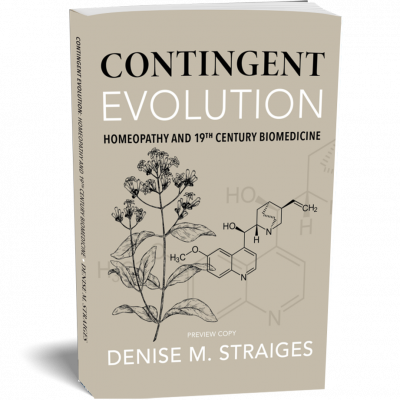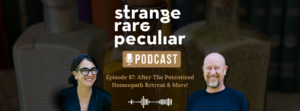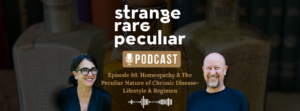
Fresh off the press—get your copy now!
The historiography of medicine has perpetuated an ideal of progress which excludes scientific discoveries that evolved outside of conventional medicine. Homeopathy, the system of medicine introduced by Samuel Hahnemann, offers a counter-narrative of non-orthodox practitioners engaged in similar paths of discovery. In Contingent Evolution: Homeopathy and 19th Century Biomedicine, Denise M. Straiges explores the struggle that homeopaths in the nineteenth century experienced between remaining faithful to homeopathic principles and embracing scientific innovations.
“It has been said that ‘history is written by the victors,’ and this is not just true about the victors in wars but also the victors in economic and professional arenas. Because of this, conventional medicine has claimed to be the primary and the only proponent of ‘science’ and has deemed homeopathy and many other unconventional treatment systems as ‘quackery’ or as simply ‘unscientific.” However, Denise Straiges’ book, which derived from her masters thesis in medical history from Johns Hopkins University, shows how developments in homeopathy in the mid- and late-1800s provide evidence of how homeopathy had numerous contributions to the development of scientific medicine in certain aspects of its philosophy and its therapeutics. Straiges provides evidence that medical history is much more nuanced than just linear evolution, and in this light, homeopathic medicine in the 19th century played an important role in what continues to evolve as ‘modern scientific medicine.’”
—Dana Ullman, MPH, CCH, author of 10 renowned books about homeopathy and contributor to several medical textbooks
 Denise M. Straiges is a 2023 graduate of the JHU History of Medicine Program. Her thesis, Contingent Evolution: Homeopathy and 19th Century Biomedicine explores how the uptake of bacteriological discoveries into the canon of 19th century medical knowledge was an interdependent and non-linear process in both orthodox and heterodox spaces.
Denise M. Straiges is a 2023 graduate of the JHU History of Medicine Program. Her thesis, Contingent Evolution: Homeopathy and 19th Century Biomedicine explores how the uptake of bacteriological discoveries into the canon of 19th century medical knowledge was an interdependent and non-linear process in both orthodox and heterodox spaces.









